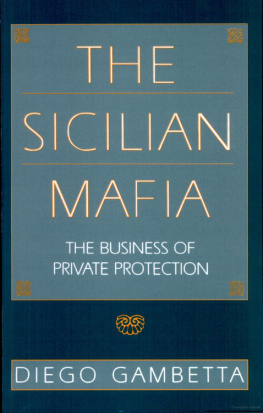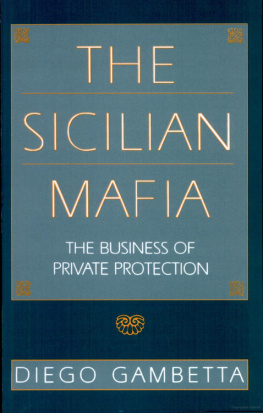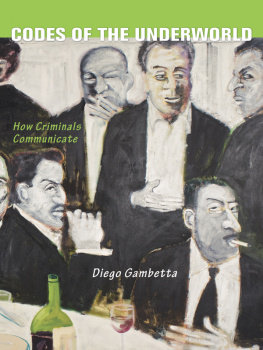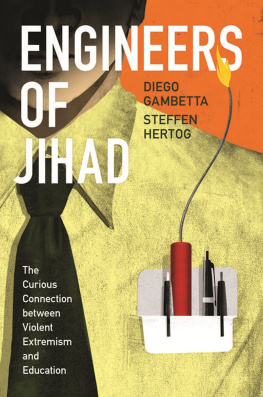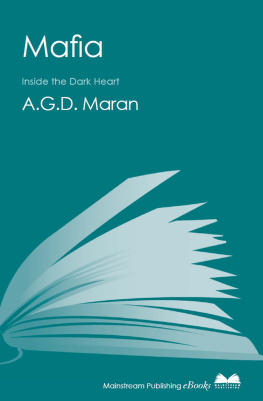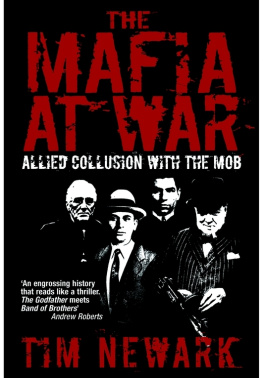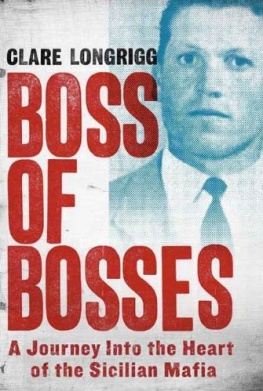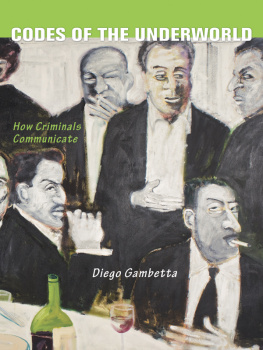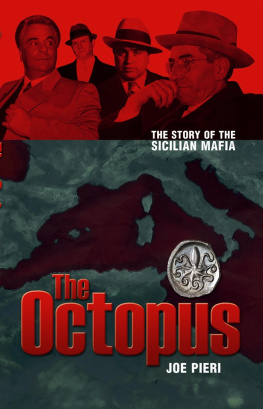Diego Gambetta - The Sicilian Mafia: The Business of Private Protection
Here you can read online Diego Gambetta - The Sicilian Mafia: The Business of Private Protection full text of the book (entire story) in english for free. Download pdf and epub, get meaning, cover and reviews about this ebook. year: 1996, publisher: Harvard Univ Pr, genre: Politics. Description of the work, (preface) as well as reviews are available. Best literature library LitArk.com created for fans of good reading and offers a wide selection of genres:
Romance novel
Science fiction
Adventure
Detective
Science
History
Home and family
Prose
Art
Politics
Computer
Non-fiction
Religion
Business
Children
Humor
Choose a favorite category and find really read worthwhile books. Enjoy immersion in the world of imagination, feel the emotions of the characters or learn something new for yourself, make an fascinating discovery.
- Book:The Sicilian Mafia: The Business of Private Protection
- Author:
- Publisher:Harvard Univ Pr
- Genre:
- Year:1996
- Rating:4 / 5
- Favourites:Add to favourites
- Your mark:
- 80
- 1
- 2
- 3
- 4
- 5
The Sicilian Mafia: The Business of Private Protection: summary, description and annotation
We offer to read an annotation, description, summary or preface (depends on what the author of the book "The Sicilian Mafia: The Business of Private Protection" wrote himself). If you haven't found the necessary information about the book — write in the comments, we will try to find it.
The Sicilian Mafia: The Business of Private Protection — read online for free the complete book (whole text) full work
Below is the text of the book, divided by pages. System saving the place of the last page read, allows you to conveniently read the book "The Sicilian Mafia: The Business of Private Protection" online for free, without having to search again every time where you left off. Put a bookmark, and you can go to the page where you finished reading at any time.
Font size:
Interval:
Bookmark:
byDiego Gambetta
Firstpublished 1993
Thisebook (v1.4) created 10 March 2020
ISBN0-674-80742 (original paperback)
Digitizedand converted by Johnny Kurzon
Noticeany errors? Send an email to johnnykurzon@outlook.com
GiovanniContini deserves credit for sowing the seeds of my intellectualcuriosity about Sicilian society. Daniel Bell, Partha Dasgupta, andGeoffrey Hawthorn encouraged me at crucial moments of my research andcontributed commentswhich shaped the approach of this book. Pascal Boyer drew myattention to the way in which the meaning of some rituals lies in thefact that, in themselves, they mean nothing at all. Luca Anderlini,Alex Kacelnik, Carol Mershon, Lucy Riall, Hamid Sabourian, TonyTanner, George Tsebelis, Alberto Yannucci, and FedericoVarese offered constructive commentsonvarious partsofthemanuscript.
Duringmy stay in Palermo I benefited from the assistance of several people,not all of whom, however, wish to be mentioned here. Anna Puglisi andUmberto Santino were very generous hosts and gave me access to thelibrary and facilities of the Centro di Documentazione GiuseppeImpastato. Commissioner Saverio Montalbano kindly shared with me hisviews on the subject of the mafia. I am also indebted to SalvatoreModica and his gracious friends for their instructive conversation.Furthermore,my gratitude goes to Susi Abbate, Giovanna and Giovanni Accardi,Giulia Aurigemma, Giorgio Chinnici and his family, Giancarlo LoCurzio, Santo Quartuccio, and Mario Romeo, who contributed to makingmy research possible and my life more pleasant. Above all I amgrateful to Judge Paolo Borsellino; the time he devoted to me seemseven more precious now, since his vicious murder.
Theassistance of Donato Messina and Antonina Reina was essential inacquiring the judicial sources. Giancarlo Barroloni, who works forSinistra Indipendente at the Senate in Rome, was instrumental inobtaining the parliamentary files. The Cambridge University Library,Stephen Lees and William Noblett in particular, undertook to purchaseandpreserve a number of sources and were generally very helpful. CarloGambetta, my father, put his meticulous inspection of the daily pressto very good use to supply me with an impressive collection ofclippings about the mafia.
Ireceived funding from two sources. An International Fellowship fromFORMEZ (Training and Studies Center for Southern Italy) supported meduring my fieldwork in 1986-87. Forthis I am particularly indebted to Guido Martinottifor his spontaneous backing. In 1989 theEconomic and Social Research Council of Great Britain gave me a grantto employ a full-time research assistant for a year. Finally, King'sCollege Research Centre hosted the project and provided both officefacilities and a friendly environment.
Anearlier version of portions of Chapter 6 and Appendix A wasoriginally published in 1991 as"In the Beginning Was the Word: The Symbols of the Mafia,"ArchivesEuropenes de Sociologie32(1): 53-57.
Mydebt of gratitude to Heather Martin and Amanda Heller, whose editingskills have made this book both grammatical and more concise, hasreached heights which words cannot adequately express (and they wouldedit them out anyway). My deepest thanks are reserved for ValeriaPizzini, my collaborator for the last two years, whose criticalacumen in sifting through the empirical evidence has had anincalculable impact on the quality of this book.
CONTENTS
Archaiccodes, brutal executions, obscure symbols, blood ceremonies: themafia's manifestationsappear so bizarre that it is natural to see them as remnants of adefunct subculture. Mafiosi seem radically different from "us,"and the categories which make sense of our dealings and rituals aredeemed unsuitable for understanding theirs; the mafia is more readilyassociated with nonrational forces. The mafiosi themselves fuel andexploit this mythology to increase their power of intimidation. Thisbook, by contrast, tries to make sense of the mafia in simple,rational terms.
Butwhat exactly isthemafia? The hypothesis developed here is that the mafia is a specificeconomic enterprise, an industry which produces, promotes, and sellsprivate protection. The mafia represents this industry as it hasdeveloped in Sicily over the last one hundred and fifty years.Examples of the same industry are present in different forms in otherparts of southern Italy and in other countries as well. In Sicilyitself the mafia is not the only brand name; it grudgingly shares themarket with smaller groups which also deal in protection.
Toconsider the mafia an industry is not a novel idea. Writing in 1876,Leopoldo Franchetti called it"l'industriadella violenza," and he meant industryinthe literal sense. As his definition suggests, however, the commoditywhich which the mafia has been most closely associated is violence,not protection. "Monopoly on violence" is a standardexpression in mafia studies to indicate what the state has failed toachieve in southern Italy, namely, full control over the use offorce. This failure has been singled our as the main impetus behindboth the rise and the periodic recrudescence of the mafia (Blok 1974;Arlacchi 1983a: 106). This understanding of the problem is in keepingwith Max Weber's famous definition of the state as an agency thatsuccessfully claims a monopoly over the legitimate use of physicalforce within a given territory, a definition which in turn goes backto a central tenet of modern political thought: from Machiavelli toHobbes, the organization and monopolization of the means of violencehas been regarded as the quintessential activity of governments. Itis also the basis on which the mafia and the state have been equated.
Althoughfacile analogies must be resisted, in analytical terms the state andthe mafia do indeed deal in the same commodity. It is not, however,reducible to the use of force alone. Despite Franchetti's study,which remains arguably the best on the Sicilian mafia to date, todefine the mafia as "the industry of violence" is open tomisunderstanding. Violence is a means, not an end; a resource, notthe final product. The commodity that is really at stake isprotection. Itmay be argued that ultimately protection rests on the ability to useforce, butit does not follow that it coincides with it. Protection is anambiguous commodity. As Charles Tilly writes: "The wordprotection sounds two contrasting tones. One is comforting, the otherominous. With one tone 'protection' calls up images of the shelteragainst danger provided by a powerful friend, a large insurancepolicy, or a sturdy roof. With the other, it evokesthe racket in which a local strong manforces merchants to pay tribute in order to avoid damagedamagethe strong man himself threatens to deliver" (1985: 170). Thosewho supply protection are inclined to exaggerate and manipulate itsdesirability; the state is no exception: "Since governmentsthemselves commonly simulate, stimulate, or even fabricate threats ofexternal war... governments themselves often operate in essentiallythe same way as racketeers" (Tilly 1985: 171).Rather than ennobling the mafia, this parallel makes us reflect onsome disturbing aspects of the state.
Protectioncan nevertheless be a genuine commodity and play a crucial role as alubricant of economic exchange. In every transaction in which atleast one party does not trust the other to complywith the rules, protection becomes desirable, even if it is a poorand costly substitute for trust. This book shows that mafiaprotection fulfills this role, albeit in an erratic and limitedfashion. The market is therefore rational in the sense that there arepeople who find it in their individual interest to buy mafiaprotection. While some may be victims of extortion, many others arewilling customers. This situation was perceived in the nineteenthcentury, yet its implications have never been explored in full,perhaps owing to the difficulty of reconciling the facts that themafia can supply a real service while being at the same time an evilthat must be opposed. There is a propensity to reduce cognitivedissonance by reverting to the view of mafiosi as mere extortionists.
Font size:
Interval:
Bookmark:
Similar books «The Sicilian Mafia: The Business of Private Protection»
Look at similar books to The Sicilian Mafia: The Business of Private Protection. We have selected literature similar in name and meaning in the hope of providing readers with more options to find new, interesting, not yet read works.
Discussion, reviews of the book The Sicilian Mafia: The Business of Private Protection and just readers' own opinions. Leave your comments, write what you think about the work, its meaning or the main characters. Specify what exactly you liked and what you didn't like, and why you think so.

